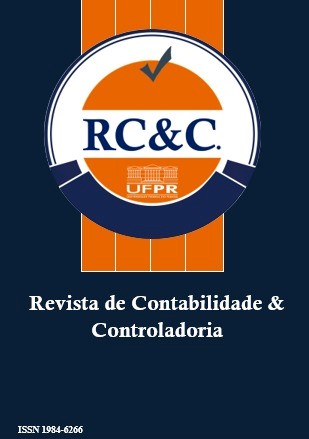Auditors' Opinions and Tax Aggressiveness in Brazilian Companies
DOI:
https://doi.org/10.5380/rcc.v16i3.97376Resumo
This study delves into the intricate relationship between independent auditor opinions and corporate tax aggressiveness. We investigate whether the characteristics of auditor opinions, such as the presence of caveats, length, readability, and verbal tone, signal a company's tendency to engage in aggressive tax practices. Utilizing a quantitative approach, we employed a multiple linear regression model on a dataset of 1,271 observations from companies listed on the B3 stock exchange between 2017 and 2022. Tax aggressiveness was measured using established proxies like book-tax differences (BTD), effective tax rate (ETR), and tax rate on value added (TTVA). Our findings reveal a lack of significant correlation between the informational content of auditor opinions and corporate tax aggressiveness. Contrary to expectations, characteristics such as caveats, length, readability, and verbal tone did not significantly signal corporate tax strategies. This suggests that while auditor opinions are vital for financial reporting and corporate governance, their ability to indicate tax practices might be limited or indirect. These insights add to the discourse on corporate governance and tax compliance, promoting transparent and equitable business practices. Further research is needed to identify other factors that may influence tax aggressiveness and to better understand the dynamics between auditors and corporate tax strategies.
Downloads
Publicado
Como Citar
Edição
Seção
Licença
Copyright (c) 2025 RC&C. Revista de Contabilidade e Controladoria

Este trabalho está licenciado sob uma licença Creative Commons Attribution-NonCommercial-NoDerivatives 4.0 International License.
Os trabalhos publicados na RC&C. Revista de Contabilidade e Controladoria estão sujeitos aos seguintes termos:
1.1. A RC&C. Revista Contabilidade & Controladoria, através do Programa de Pós-Graduação em Contabilidade do Departamento de Contabilidade - Setor de Ciências Sociais Aplicadas - Universidade Federal do Paraná, retém os direitos de propriedade (direitos autorais) dos trabalhos publicados e incentiva e permite sua reutilização sob a Licença Creative Commons 4.0 de CC Attribution-NonCommercial-ShareAlike 4.0, para que possam ser copiados, utilizados, disseminados, transmitidos e exibidos publicamente, desde que:
1.1.a. A autoria e a fonte original da publicação (periódico, editora, URL e DOI do trabalho) sejam citadas.
1.1.b. Não sejam utilizados para fins comerciais ou onerosos.
1.1.c. A existência e as especificações desta licença de uso são mencionadas.
1.2. A publicação atribuirá a cada artigo um Identificador de Objeto Digital (DOI).









